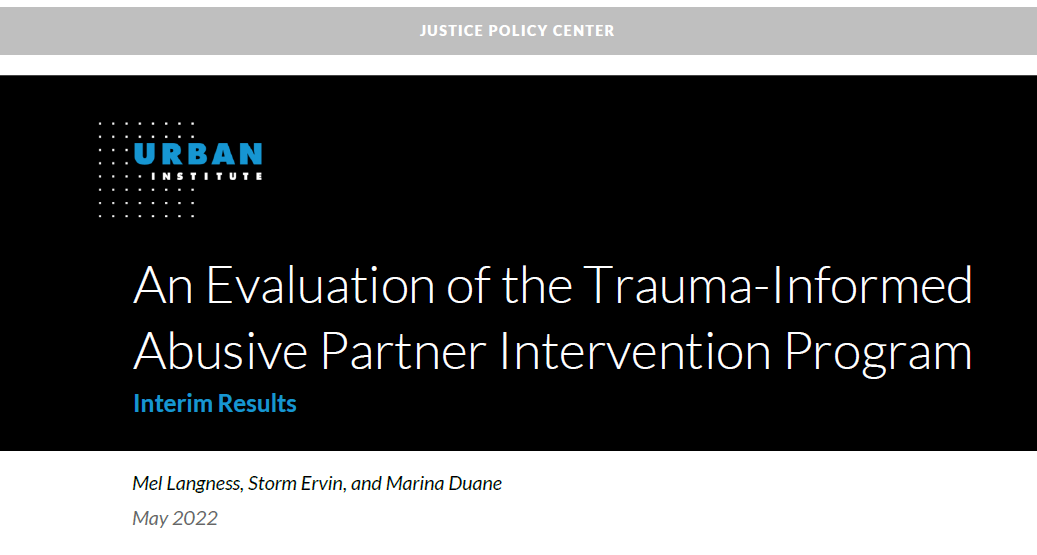Incorporating Trauma-Informed Principles into Abusive Partner Intervention Programs
By Kristen Parsons, Research Associate
Through its CJII-funded Trauma-Informed Abusive Partner Intervention Program (TI-APIP), over the past three years the Urban Resource Institute (URI) has implemented a holistic, wraparound approach to working with abusive partners to change the justifications, attitudes, and beliefs that perpetrate abuse.
Abusive partner intervention programs (APIPs) were developed in the late 1970s in response to the longstanding public health crisis that is domestic violence, in particular intimate partner violence (IPV). Although policies around and implementation of such programs vary, most traditional program models aim to increase participant accountability by teaching them skills for nonviolence. In more recent years, practitioners and academics have advocated for more intentional incorporation of trauma-informed principles into these models to more effectively identify and consider how participants’ trauma histories, needs, and experiences contribute to their abusive behavior. By treating trauma and educating participants on healthy relationships and negative gender roles, APIPs can foster an environment where abusive partners can process their underlying beliefs and attitudes that contribute to IPV.
As part of the New York County District Attorney’s Office (DANY) Criminal Justice Investment Initiative (CJII), the Urban Resource Institute (URI) was selected to design and pilot a trauma-informed abusive partner intervention program (TI-APIP) beginning in 2019. URI’s TI-APIP operates a 26-week court-mandated API group with curriculum-based activities, including special topic discussions, healing circles, and journaling assignments. URI also offers other services for participants, such as individual counseling and tailored referrals to external supports that match specific needs. Through CJII, the Urban Institute conducted a process evaluation to determine interim findings on the program’s implementation. The evaluation assessed the program as of August 2021, when the program had enrolled 48 abusive partners, all of whom reported having experienced at least one form of trauma in their lifetime (e.g., experienced childhood abuse, were a target of community violence). The findings indicate that this funding allowed URI to pilot a holistic, wraparound APIP that integrates trauma-informed principles across varying aspects of the program outside the curricula itself, including in one-on-one supports, policies and procedures, and even the physical space in which the TI-APIP is held.
Individualized Supports that Meet Participants’ Immediate Needs
URI understands that abusive partners cannot meaningfully take part in programming that fosters positive behavior change without also considering their experiences in everyday life. TI-APIP staff actively acknowledge that abusive partners’ most urgent challenges—such as food insecurity or unsafe housing—must be addressed in order for them to engage and remain in services. Accordingly, the program may provide participants with MetroCards, snacks, and full meals, or assist them in obtaining school or work supplies. According to one TI-APIP facilitator, “For these types of programs to work, it has to be much more than the 1.5 to 2 hours they are in the room.”
Flexibility in Policies and Procedures
Because the TI-APIP is court-mandated, participants are required to attend weekly sessions for approximately six months. Any absences are reported to DANY, defense counselors, and the courts. That said, TI-APIP and DANY collaborated to develop scaled actions for absences as opposed to immediate dismissal from the program for a single absence, acknowledging that participants may miss a session due to unexpected or unavoidable obligations (e.g., employment schedule changes or required travel for court). In accordance with trauma-informed principles, stakeholders attempt to avoid dismissing participants as the first response to poor attendance, allowing participants up to three absences and also grant them the opportunity to make up those sessions. Additionally, TI-APIP staff can provide participants with alternative arrangements if they are late to class (e.g., assigning additional journal entries) to avoid considering them absent for the session if they otherwise engage in the programming that day. Such flexibility in URI’s policies allow participants to address important life events while also emphasizing accountability.
A Trauma-Informed Program Space
Trauma-informed principles are also incorporated into the physical TI-APIP program space; for example, group sessions are held in well-lit room with a large window and chairs organized in a circle to facilitate discussion. The main lobby of the TI-APIP also features comfortable furniture and a computer lab that participants can access for personal needs. Such design choices are an effort to create a safe and welcoming space for participants to not only meaningfully engage in program activities but also to utilize resources they may not have reliable access to otherwise.
About the Program and Evaluation
The evaluation of the TI-APIP, conducted by the Urban Institute, is funded through the Criminal Justice Investment Initiative (CJII) of the Manhattan District Attorney’s Office (DANY). The mid-evaluation findings demonstrate how the TI-APIP successfully weaves trauma-informed values into its programming through treatment of individual needs, flexible policies and protocols, and the physical space in which the program operates. The Urban Institute plans to conduct additional exit surveys and focus groups with participants; review program data; and analyze and compare criminal legal administrative data of TI-APIP participants and a comparison group. The final process and outcome evaluation findings will be published in 2023.
About the Criminal Justice Investment Initiative (CJII)
The Manhattan District Attorney’s Criminal Justice Investment Initiative (CJII) focuses on three investment areas—crime prevention, reentry and diversion, and supports for survivors of crime. The TI-APIP is funded through the Victims of Crime Portfolio, whose goal is to increase awareness and use of services among victims of crime and trauma-affected individuals.
The CUNY Institute for State & Local Governance manages and provides technical assistance to CJII contractors, and conducts oversight and performance measurement throughout the lifetime of the initiative.

